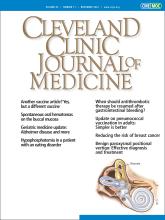ABSTRACT
Recommendations for pneumococcal vaccination in adults have been updated in the hopes not only of preventing more cases of invasive pneumococcal disease but also of making the recommendations simpler and easier to follow.
Adults age 65 and older at average risk who have not yet received any pneumococcal conjugate vaccine should receive either 1 dose of 20-valent pneumococcal conjugate vaccine (PCV20), or 1 dose of 15-valent pneumococcal conjugate vaccine (PCV15) followed at least 1 year later by 1 dose of 23-valent pneumococcal polysaccharide vaccine (PPSV23).
The same recommendation applies to those age 19 through 64 at higher risk who have not yet received any pneumococcal conjugate vaccine.
Adults who previously received PCV13 should receive PPSV23 according to previous recommendations of the Advisory Committee on Immunization Practices, but PCV20 can be used in place of PPSV23 if the latter is hard to obtain.
Adults who previously received only PPSV23 may receive 1 dose of PCV20 or PCV15 at least 1 year after their last PPSV23 dose.
Recommendations for pneumococcal vaccination in adults have evolved as newer vaccines with different antigens have become available and the incidence of disease has fallen. This article summarizes the 2022 guidelines from the Advisory Committee on Immunization Practices (ACIP) of the US Centers for Disease Control and Prevention (CDC).1,2
HOW THE RECOMMENDATIONS EVOLVED
Recommendations for pneumococcal vaccination in adults go back 25 years:
1997: Give 1 dose of the 23-valent pneumococcal polysaccharide vaccine (PPSV23) to adults at average risk age 65 and older.3,4
2012: Give both the 13-valent pneumococcal conjugate vaccine (PCV13) and PPSV23 to adults with immunocompromising and other medical conditions that place them at higher risk of invasive pneumococcal disease.5,6
2014: Expanded indications for PCV13—give it, along with PPSV23, to all adults age 65 and older.7
2019: Another layer of complexity—do not automatically give PCV13 to adults age 65 and older, but use a process of shared clinical decision-making to help determine who should get it in addition to the PPSV23 vaccine.8,9 The evolution of these guidelines over a relatively short time seemed to create a level of complexity around practice implementation and patient understanding.
2022: The ACIP revises the guidelines in the hopes not only of preventing more cases of pneumococcal disease but also of simplifying the recommendations and thereby making them easier to implement.1
THE NEW RECOMMENDATIONS
The new recommendations1,2 revolve around 3 vaccines and 2 dosing schedules: 15-valent pneumococcal conjugate vaccine (PCV15) in series with PPSV23, and 20-valent pneumococcal conjugate vaccine (PCV20).
Adults who have not received a pneumococcal conjugate vaccine previously
Give 1 dose of PCV20 alone, or give 1 dose of PCV15 now and give PPSV23 at least 1 year later to:
Patients age 65 and older at average risk of invasive pneumococcal disease
Patients age 19 to 64 at higher risk (Table 1).
No additional doses beyond the initial doses are recommended at this time.
Recommendations for the initial pneumococcal vaccination in adults who have not yet received a pneumococcal conjugate vaccine
Adults who previously received PCV13
These patients should receive PPSV23 as previously recommended by the ACIP. The benefit of getting PCV15 or PCV20 after getting PCV13 has not been evaluated. Guidance essentially remains unchanged from before this current revision.
This being said, PCV20 can be used in place of PPSV23 if the latter is hard to obtain. If patients receive PCV20 or PCV15 plus PPSV23, such that they are transitioned to the new recommendations, no additional doses at age 65 are necessary.1,2
RATIONALE FOR THE CHANGE
The incidence of pneumococcal disease (pneumococcal pneumonia and meningitis) has been steadily decreasing over the past 20 years, ever since PCV7 vaccination was started in children in 2000, and has been declining further with the introduction of PCV13 in 2010.1,8 These reductions are thought to be predominantly from indirect effects on pneumococcal transmission through herd immunity.
In 2021, the US Food and Drug Administration licensed the PCV15 and PCV20 vaccines for all adults over age 65 and for adults age 19 to 64 with risk factors for invasive pneumococcal disease. The 2 additional serotypes covered by PCV15 cause an additional 15% of cases of invasive pneumococcal disease, and the 7 additional serotypes included in PCV20 cause an additional 27% of cases beyond those covered by PCV13.1 We anticipate that the introduction of the PCV15 and PCV20 will lead to further reductions in the incidence of pneumococcal disease.
The safety and efficacy of both PCV15 and PCV20 were evaluated in multiple randomized controlled trials, and no significant adverse events or deaths were noted with either vaccine. The most commonly reported side effects included injection site reactions, fatigue, myalgias, arthralgias, and headache.
CONTINUED EVOLUTION
The 2022 ACIP recommendations1,2 continue the evolution of the pneumococcal vaccine guidelines over the past 25 years. Like all new recommendations, they may take some time to implement in clinical practice.
The guidelines are most straightforward in adults who have not yet received any pneumococcal vaccine. They are a little more complicated for those who have partially completed their vaccination series and those with immunocompromising or underlying conditions. For these groups, the new guidelines are still similar to the earlier iterations of the guidelines, but they do allow for a transition to a simpler approach.
The CDC has a mobile app, PneumoRecs VaxAdvisor, to help physicians and other providers determine which pneumococcal vaccines are recommended for their individual patients: https://www.cdc.gov/vaccines/vpd/pneumo/hcp/pneumoapp.html.
In the end, we hope the ACIP’s attempt to simplify regimens across age and risk groups will improve vaccination compliance in our patients.
DISCLOSURES
Dr. Tan has disclosed teaching and speaking for Pfizer. The other authors report no relevant financial relationships which, in the context of their contributions, could be perceived as a potential conflict of interest.
- Copyright © 2022 The Cleveland Clinic Foundation. All Rights Reserved.






